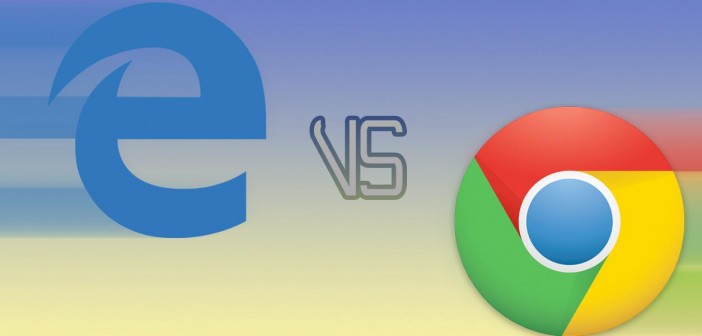Benchmarking Microsoft’s new Edge and Google Chrome to test which is better

After ruling the browser arena for many years, the image of Microsoft Corporation’s Internet Explorer browser over the years has been severely damaged. The users have continued to ignore it in spite of Microsoft trying its best to improve the browser and make it more effective.
To change its image and enhance user experience, Microsoft came up with Microsoft Edge browser in Windows 10. Bringing a collection of improvements over previous Microsoft’s version, the new browser has a clean and improved interface, which is not restricted to standards compliance, speed and security.
Considered as the preferred browser by many users, Google’s Chrome has captured a major share in the market in spite of its obvious battery drainage and memory leak problems. However, over the years, other browsers, including Firefox, Safari, Opera and UC Browser have managed to corner some part of the browser pie.
With web technology continuously developing over a period of time, the browsers too need to evolve simultaneously to support the new standards. The browsers have started to come of age due to years of tacked-on updates to support CPU-hogging plugins and additional technologies. Chrome, which was once considered as the most effective and fastest browser, is now only remembered for being a memory hog and draining battery life on laptops.
Would all these issues be put to rest by Microsoft’s new offering, or will it just be more of the same?
To find out if the browser’s performance is better than the likes of the latest version of Internet Explorer and Chrome, CNET Labs took it upon itself to find out. Browser-based benchmarks were carried out on both a low-end and a high-end machine to ensure a fair comparison.
The tests exclusively carried out on Windows 10 don’t make much of a difference, as the benchmark applications function more or less the same way on Windows 8 and 10. Starting from $1,299 and equipped with a latest-generation Intel Core i5 CPU, the high-end machine that was used was the Dell XPS 13. While on the other hand, there is Microsoft’s own entry-level Surface hybrid PC, Microsoft Surface 3 powered by the budget Intel Atom processor.
To conclude the performance of a browser, a variety of in-browser benchmarks can be run. In order to better determine the speed and rendering capabilities of each browser, four different benchmarks were used for this specific test.
The first benchmark used was Peacekeeper from Futuremark, which concentrates on mathematical and memory usage. Taking the place of the previous crowd favorite, Sunspider is Jetstream, which is a new JavaScript performance test that is on the second position. In the end, the Google-developed Octane test was run.
Any of the above-mentioned tests can be performed on your current browser as well, be it desktop or mobile.

For a browser in its first edition, Microsoft Edge has performed significantly well as shown in the charts above. Although Chrome beat the browser in terms of performance in half the tests, its battery and RAM drainage issues are enough to turn the tides in Microsoft’s favor. The Edge browser performed better than Google Chrome in Google’s own Octane benchmark test especially on the Surface Pro 3. Internet Explorer, held its own in the tests and performed a lot better than one would expect in the test considering its damaged image.

Based on these test results, Microsoft can be safely suggested as a primary browser of choice considering that Windows 10 and Microsoft Edge are still in its early stages.
Performing as per standards is one aspect. However, in reality, in addition to being lightweight, the browser was found to be very fast and neat. Thanks to the lack of extension support, the browser is kept lightweight, that is preventing many of the Chrome users from switching to Edge.

Overall, Chrome is a solid browser; however, it’s major RAM and battery issues act as an discouragement for many. Until these issues are addressed by Google, Microsoft Edge can be thought of as the best web browser for simple browsing. Whereas, Chrome and Firefox still rule the market for more advanced tasks such as web development.-
No comments:
Post a Comment